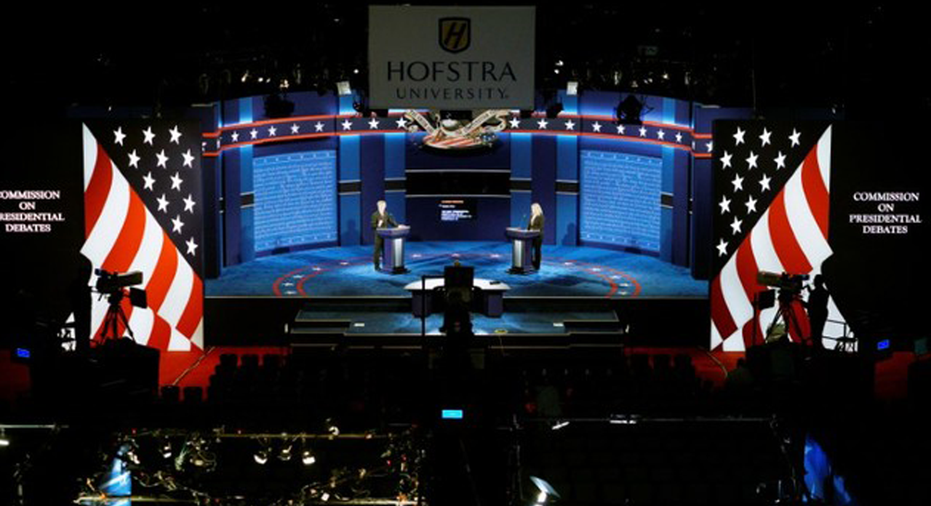Debates Will Influence a Third of Voters

The campaigns of Donald Trump and Hillary Clinton acknowledged the huge stakes of Monday's televised presidential debate, saying the event could shape the opinions of a large number of Americans who have yet to settle on their choice in what has been a bruising presidential election.
After more than year of campaigning and attacking each other from afar, the two candidates will meet face to face for the first time, on a stage in Hempstead, N.Y. And as hard as it is to imagine, there remain enough undecided and loosely committed voters left that this nationally televised forum could produce one more pivot point in the campaign.
"In many ways, with this debate coming up, we're just starting," said Robby Mook, Mrs. Clinton's campaign manager, on ABC Sunday.
Added Kellyanne Conway, Mr. Trump's campaign manager, speaking on the same network: "This will be the first time Americans have seen Donald Trump and Hillary Clinton on the same stage, and they're going to be able to make their choice based on what they see."
The first of three scheduled debates marks the campaign's move into the home stretch, with the Democrat Mrs. Clinton narrowly leading her Republican rival in polls. Though polls find both major-party candidates viewed negatively by large swaths of the electorate, Monday's debate gives them a chance to reset their public images before an audience that could top the record 80 million who watched Ronald Reagan debate then-President Jimmy Carter in 1980.
"I feel like they are both bad choices," said Melissa Huber, a 39-year-old day-care provider in Oklahoma. "I'm hoping that through the debate one of them will come out as a preferred option."
Monday's debate at Hofstra University will be carried by a variety of television networks and social-media sites. A vice-presidential debate and two more presidential debates will follow in coming weeks.
A new Wall Street Journal/NBC News poll found that 34% of registered voters think the three presidential debates would be extremely or quite important in helping them decide whom to support for president. About 11% of voters are considered "debate persuadables" -- that is, they think the debates are important and are either third-party voters or only loosely committed to either major-party candidate.
Slightly more Republicans than Democrats said the debates would be important to them, 37% to 31%. But voter groups that seem poised to pay the most attention include several that Mrs. Clinton is counting on to win. Some 49% of Hispanics, 42% of African-Americans and 39% of voters under age 35 say that the debates will be extremely or quite important to them.
Some of the most attentive viewers of the Clinton-Trump debates may be supporters of a candidate not on stage: 44% of people supporting Libertarian candidate Gary Johnson consider them very important.
Ms. Huber is thinking of supporting Mr. Johnson, but said Mr. Trump could win her over in the debate if he was to "show a little decorum. Show that he can be presidential."
Arnitress Dowdy, 39, an African-American who hasn't settled on a candidate, is inclined to support Mrs. Clinton and is hoping to hear her address issues of race and police violence in the wake of the unrest in Charlotte, N.C.
"I'm not sure who is really well equipped; I just need to hear more," said Ms. Dowdy, a mother of two in New York. "I know she has advocated for children. I want to know what she will do so things will calm down."
On Sunday, the Trump and Clinton campaigns tried to set expectations for the debate moderators as well as the candidates. Mr. Mook said that moderator Lester Holt, the anchor of NBC's nightly news broadcast, should step in if needed to correct misstatements by Mr. Trump. "All that we're asking is that, if Donald Trump lies, that it's pointed out," he said. "It's unfair to ask Hillary both to play traffic cop with Trump, make sure that his lies are corrected, and also to present her vision."
Ms. Conway, of the Trump campaign, denied that Mr. Trump needed to be kept in check, saying that polls show that he is viewed as more honest and trustworthy than Mrs. Clinton. And Gov. Mike Pence, Mr. Trump's running mate, said that in the last presidential election a moderator had made a factual error in the course of trying to fact-check candidates.
"We need the hear from these two candidates, and I hope and trust that the moderators will just facilitate that," Mr. Pence said.
Where campaigns sometimes try to play down expectations for their candidate, Ms. Conway cast Mr. Trump as strong on the debate stage.
While denigrating Mrs. Clinton's skills as a candidate, Ms. Conway described the GOP nominee as "a brilliant debater....He's like the Babe Ruth of debating."
The two campaigns also engaged in a bit of psychological combat. After Mark Cuban, the businessman and prominent critic of Mr. Trump, said he planned to sit in the front row Monday in the debate hall, Mr. Trump responded by saying on Twitter that he might invite Gennifer Flowers to sit next to him. Ms. Flowers conducted a relationship with former President Bill Clinton that threatened to derail his first presidential campaign when she disclosed it.
Ms. Flowers on Twitter appeared to accept the invitation. But Mr. Pence said Sunday that she wouldn't be attending the debate.
For all the drama surrounding the Clinton/Trump match up, the extent to which the debates could potentially persuade voters isn't markedly different than in previous presidential elections. The share of voters who said the debates were important to their decision was 38% in 2012, 31% in 2004 and 36% in 2000, close to the 34% of this year's voter pool.
The Journal/NBC News survey of 1,000 registered voters was conducted Sept. 16-19. The poll's margin of error was plus or minus 3.1 percentage points.
Write to Janet Hook at janet.hook@wsj.com and Andrew Ackerman at andrew.ackerman@wsj.com



















